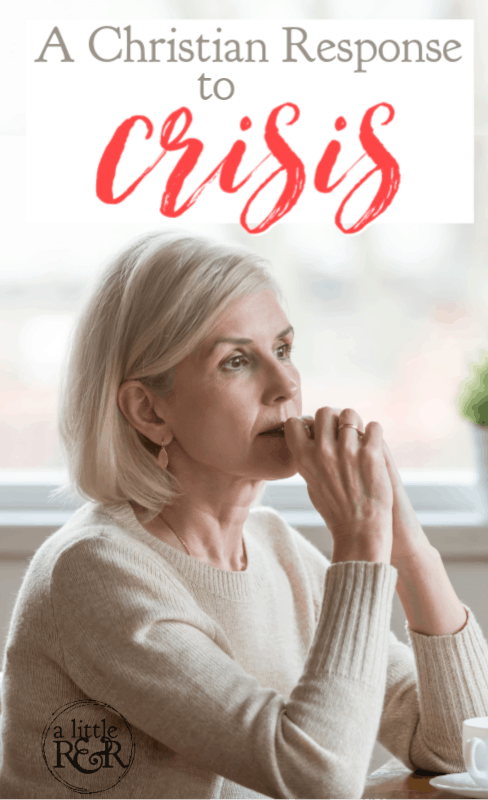A Christian Response to Crisis
I hope you love the products and resources I recommend here at A Little R & R. Just so you know, it is possible that I get a commission and collect income from the links on this page. Click here for more info. I am not a doctor, none of the information on any of these pages pertaining to the Ketogenic Diet or Adrenal Fatigue should be considered medical advice and should not replace the care of your personal physician. I am simply eager to share the information I have learned while on my own journey to health. Before you embark on this journey, please consult with your physician.
It’s been very interesting, over the past several months, to sit back and observe people’s response to the crisis we’ve faced around the world.
- How people responded when COVID began to spread rapidly around the world.
- How people responded to the shut downs, and how they responded 30 days later when they expected their state or country to open up again.
- How people responded to their leaders as they eased up on the measures.
- And finally, how they responded to the economic predictions following the shut down.
A Christian’s response to crisis should look completely different than the response of those in the world.

It is really easy to get caught up in calling everything a conspiracy, but this is what Isaiah warns us to do.
“Do not call conspiracy everything this people calls a conspiracy; do not fear what they fear, and do not dread it. The Lord Almighty is the one you are to regard as holy, he is the one you are to fear, he is the one you are to dread.” Isaiah 8:12-13 NIV
Christians are people of faith, and our faith should inform our actions, especially in times of crisis.
While we can’t see the path to a solution better than anyone else, we can trust that God is still in control.
The writer of Hebrews talked about this.
“Now faith is the substance of things hoped for, the evidence of things not seen.” Hebrews 11:1
We don’t have to know how things will turn out to have faith, all we have to do is learn the nature of God to understand that there is never a moment that is outside of God’s complete control.
And not only is God in control, he already has a plan for His glory and our good.
Psalm 131 is a short Psalm that speaks directly to this kind of faith.
The kind of faith that steady and confident in the face of crisis; a faith that is secure even when we’re not in control of the outcome.
“Lord, my heart is not haughty, nor my eyes lofty.”
When you look at the Hebrew words for heart, haughty, eyes, and lofty, this verse is actually saying:
“Lord, at the very core of my understanding and who I am (my person, my emotions, my inclinations, and my character), I am not proud or arrogant.
I have not exalted myself, lifted myself up, in my eyes. I don’t think more of myself than I should.”
In times of crisis we have a choice, to listen to the voices telling us they have the answer, listen to the dissenters who call out “conspiracy theorists”, or to remain steady, trusting God.
Trusting God doesn’t mean we’re passive in the face of crisis, but it does mean that we don’t get caught up in the hype and drama of the crisis.
God may even use us as an agent of change or a voice in a time of crisis, so faith is active, not passive.
“Neither do I concern myself with great matters, nor with things too profound for me.”
For this portion of Psalm 131, we could say:
I do not make concerning myself with things that are too noble or extraordinary for me to understand a way of life.
In other words, I don’t assume that I am so smart and enlightened that I can understand those things that only God was meant to understand.
Dear sister, there is freedom in this!
There is great freedom in understanding our place in God’s Universe; He is God, omniscient – all knowing; and we are not.
While He has given us the capacity to understand many things, there will always be those things that are beyond our scope of understanding.
And that is as it was always meant to be; and trying to understand all of the complexities of God and the works of God’s hands can lead to arrogance and insolence…and eventually drive us away from God.
Because we have dared to step outside of our divinely-given role in God’s creation.
We have dared to suppose that we are more than what God created us to be.
But when we humbly accept who we are in Christ: loved, adopted, redeemed, restored, and highly treasured….yet, designed to walk and live by faith — not by sight — we are free!
We are free to accept God’s Word for what it says, whether or not science agress.
“Surely I have calmed and quieted my soul, like a weaned child with his mother; like a weaned child is my soul within me.”
The Hebrew word for “calmed” here is very interesting. One of it’s meanings is “adjusted” or “balanced”.
This verse is saying, “I have adjusted and made my soul be quiet like a mature child.”
What is important for us in this verse is realizing that this is a decisive action on our part.
This is not something we rely on God to do for us, but it is a choice we make to bring our soul – our mind (our thought life), our will, and our emotions – into subjection to the Holy Spirit.
We take every thought captive.
We force our emotions to redirect themselves in accordance to God’s Word. Yes, you can do this. Your emotions are not instinctive, they are learned.
Emotions are not independent of your will, and you can help how you feel. It starts with renewing the mind.
As you renew your mind, your emotions will come into subjection to the Word of God.
This is a mark of a mature believer:
A mature believer knows his place in God’s order and he humbly accepts that place with both faith and humility.
And when he encounters those things beyond his scope of understanding, he doesn’t become shaken.
He knows how to calm his heart and spirit, as a mature child learns how to control his behavior.
Dear sister, we are living in very uncertain times.
Recent events in our world have most certainly proven that uncertainty can cause fear, anxiety, and depression that sometimes leads to substance abuse or even suicide.
How do we respond when we are not in control of the outcome?
How do we respond when dire economic predictions threaten our livelihood and our future?
May we respond in the words of Psalm 131:
- May we quiet our soul
- May we humbly accept that only God is in control of the outcome
- May we bring our mind, will, and emotions into subjection to the Holy Spirit
- May we allow God to guide us to the maturity of a “weaned child”

This post is part of the Blogging Through the Bible series with Good Morning Girls
3 Characteristics of a Person of Integrity
How to Keep a Steady Heart in Times of Crisis
3 Promises for Those Who Study the Works of God
43 Life-Changing Verses About the Bible from Psalm 119
5 Ways to Respond When You’re Under Attack
Are You a Burned Out Christian?
- Freedom in Christ FREE 14-Day Challenge for Women - July 23, 2024
- 10 Bible Verses for Freedom in Christ – FREE Download - July 16, 2024
- Walk Free In Christ – the Book of Galatians Workbook – FREE DOWNLOAD - July 3, 2024








Wonderful article! I was looking for ideas and tools to help me build a safe and positive ambience build by faith in my school like this one here